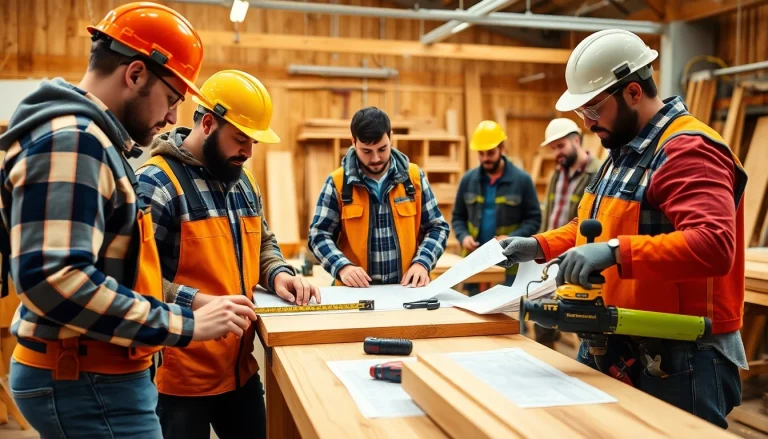
Understanding Construction Trade Schools in Texas
Construction trade schools in Texas play a vital role in addressing the state’s high demand for skilled labor in the construction industry. These institutions provide specialized training, practical skills, and relevant education to prepare students for a variety of careers in construction and related trades. By focusing on hands-on training and practical applications, trade schools offer an alternative to traditional college pathways, emphasizing the real-world experience necessary for success in the field.
Definition and Purpose of Trade Schools
Trade schools, often referred to as vocational or technical schools, focus on delivering specific skills and knowledge pertinent to particular trades or industries. In Texas, these schools emphasize practical skills in fields such as construction, plumbing, electrical work, HVAC systems, carpentry, and welding. The primary purpose of these institutions is to equip students with the competencies they require to succeed in their chosen professions.
Career Opportunities in Construction
The construction industry in Texas is expansive, offering numerous career opportunities across various trades. Graduates from construction trade schools can pursue roles such as:
- Construction Manager: Overseeing projects from start to finish, ensuring they meet timelines, budgets, and quality standards.
- Electrician: Installing, maintaining, and repairing electrical systems and wiring in residential and commercial buildings.
- Plumber: Working on installation and repair of water, gas, and drainage systems, essential for modern infrastructure.
- Carpenter: Building structures, frameworks, and furniture by cutting, shaping, and installing wood and other materials.
- Welding Technician: Joining metal components through various welding processes, critical in construction and manufacturing sectors.
- HVAC Technician: Installing and maintaining heating, ventilation, and air conditioning systems.
With Texas being one of the fastest-growing states in the U.S., the demand for skilled workforce in these areas continues to rise, making trade schools an attractive option for prospective students.
Why Choose a Trade School vs. Traditional College?
Choosing between a trade school and a traditional college education hinges on various factors including career goals, time frame, and financial considerations. Here are some compelling reasons why students may opt for trade schools:
- Duration: Trade programs typically range from a few months to two years, allowing graduates to enter the workforce sooner than they would in a four-year college program.
- Cost: Tuition at trade schools is generally lower than that of traditional colleges, reducing the financial burden on students and helping them to avoid significant student loan debt.
- Job Readiness: Trade schools focus on teaching practical skills that employers are looking for, which can lead to immediate employment opportunities upon graduation.
- Strong Industry Connections: Many trade schools have partnerships with local businesses and construction firms, providing students with internship opportunities and job placements.
Top Construction Trade Schools in Texas
Nationally Recognized Institutions
Several construction trade schools in Texas are recognized for their excellent programs and strong industry connections. Notable institutions include:
- Texas State Technical College (TSTC): Offers a comprehensive construction trade schools in texas, preparing students for various construction careers, emphasizing hands-on experience and technical skills.
- Lone Star College: Provides a variety of construction-related programs designed to meet the demand for skilled labor, including certification and degree options in several trades.
- Central Texas College: Known for its practical, hands-on approach to teaching construction trades, ensuring that students are job-ready upon graduation.
Local Colleges Offering Building Trades Programs
In addition to large institutions, various local colleges across Texas offer specialized programs in construction trades. Noteworthy colleges include:
- Alamo Colleges: Located in San Antonio, this college provides an array of programs that cover essential skills needed in construction trades.
- Houston Community College: Offers programs that cover a broad spectrum of construction disciplines, from electrical technology to construction management.
- Austin Community College: Features Associate degree programs that focus on building construction technology, combining classroom learning with practical application.
Accreditation and Quality Assurance
Accreditation is crucial when selecting a trade school, as it ensures that the institution meets certain educational standards. Many schools in Texas are accredited by recognized organizations, providing students with the assurance that they are receiving a quality education. Additionally, employers often prefer hiring graduates from accredited trade programs, as it reflects a commitment to high educational standards.
Curriculum and Skills Development
Core Subjects in Construction Trades Programs
Curriculums in construction trade schools are designed to cover a broad range of topics essential for succeeding in the industry. Core subjects often include:
- Blueprint Reading
- Construction Safety Regulations
- Project Management Essentials
- Building Materials and Methods
- Building Codes and Regulations
- Electrical Theory and Applications
- Plumbing Fundamentals
This diverse educational approach equips students with the foundational knowledge required to excel in their specific trade.
Hands-on Training and Apprenticeships
A significant component of trade school education is hands-on training, which allows students to practice their skills in real-world environments. Many institutions partner with local construction companies for apprenticeship programs. These arrangements give students the opportunity to work alongside experienced professionals, gaining invaluable insights and practical experience.
The benefits of hands-on training include:
- Enhanced understanding of job responsibilities and tasks.
- Experience with the latest tools and technologies in the field.
- Networking opportunities with industry professionals.
- Improved job readiness as students transition from school to the workplace.
Certification and Licensing Requirements
Many construction careers require certification or licensing to ensure that professionals meet industry standards. Trade schools often provide the necessary support for students to obtain these credentials. For example:
- Electricians may need to pass a state licensing exam, which typically includes training in electrical theory, codes, and safety.
- Plumbers may also require certification, often necessitating the completion of an apprenticeship program before taking the licensing exam.
Trade schools frequently have resources available for students to prepare for these exams, contributing to a smoother transition into the workforce.
Cost of Construction Trade Schools in Texas
Tuition Fees and Financial Aid Options
While trade school tuition varies, the cost is generally lower than traditional four-year colleges, with an average tuition of approximately $17,450 per year for most programs. Financial aid options are available for students, including:
- Federal Financial Aid: Students can apply for federal grants and loans to help cover tuition costs.
- Scholarships: Many trade schools offer scholarships based on merit or need to support students financially.
- Work-Study Programs: Some institutions provide opportunities for students to work on campus in exchange for tuition coverage.
Cost Comparison with Four-Year Colleges
When considering the financial implications of trade school versus traditional colleges, the affordability of trade schools is striking. The shorter duration of programs means that students can enter the workforce sooner and start earning income, ultimately leading to less debt accumulation. In comparison, the national average cost of tuition at a four-year college often surpasses $30,000 per year, without including living expenses and fees.
Budgeting for Tools and Materials
In addition to tuition, students should budget for tools and materials necessary for their specific trades. This upfront investment can vary widely but is essential for completing coursework and gaining practical skills. Schools often provide lists of required tools, and some may offer kits for students at reduced prices.
Success Stories and Alumni Network
Spotlight on Successful Graduates
Trade schools in Texas have produced numerous success stories as graduates progress to fulfilling careers in construction. Highlighting these individuals can be inspiring for current and prospective students. Many graduates have moved into supervisory roles, started their own contracting businesses, or achieved positions within larger construction firms, demonstrating the potential for professional growth following graduation.
Building a Network in the Construction Industry
Networking is crucial in the construction industry for securing job opportunities and advancing careers. Trade schools often provide platforms for students to connect with local businesses, industry associations, and alumni networks. These connections can lead to internships, job placements, and mentorship opportunities, providing a solid foundation for lifelong professional relationships.
Continuing Education and Skill Enhancement
Construction trades are continuously evolving with advancements in technology and methods. As a result, many trade schools offer continuing education programs for alumni to enhance their skills and stay current with industry developments. Investing in ongoing education helps professionals remain competitive and opens doors for additional career advancements.






